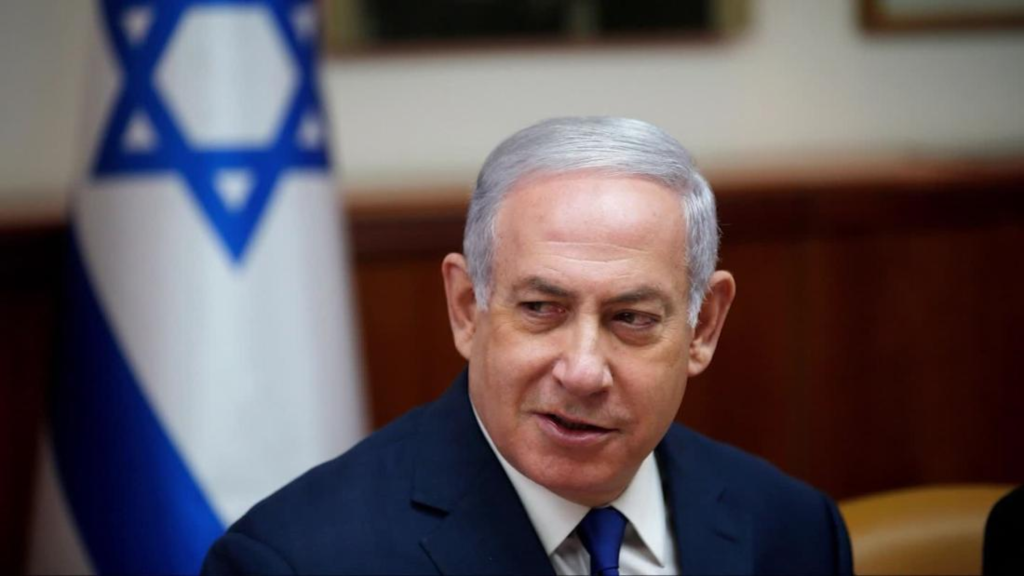Netanyahu Throws Peace Process Out The Window
Faced with an election next week, Israel's Prime Minister is pushing a settlement plan that would be an utter disaster.

Facing a tough re-election fight that comes to a head next Tuesday, but which will likely play itself out over the course of the weeks that follow as one side or the other tries to put together a majority in the Knesset, Israeli Prime Minister Benjamin Netanyahu is proposing an expansion of Israeli settlement policy that would essentially mean the end of the two-state solution:
JERUSALEM — Prime Minister Benjamin Netanyahu of Israel said Tuesday that he would move swiftly to annex nearly a third of the occupied West Bank if voters returned him to power in the election next week, seizing what he called a historic opportunity from a sympathetic White House to give Israel “secure, permanent borders.”
His plan to annex territory along the Jordan River would reshape the Israeli-Palestinian conflict and would reduce any future Palestinian state to an enclave encircled by Israel.
Mr. Netanyahu’s rivals on the left and right largely greeted the announcement, made in the heat of a campaign in which he is battling for survival, as a transparent political ploy.
Mr. Netanyahu said he planned to annex all Israeli settlements in the West Bank, and that he would move immediately after forming a new government to annex the Jordan Valley, a strategic and fertile strip of territory along the border with Jordan that runs from Beit Shean in northern Israel to the shores of the Dead Sea.
He said he wanted to capitalize on what he called the “unique, one-off opportunity” afforded him by the Trump administration, which has expressed openness to Israeli annexation of at least parts of the West Bank.
“We haven’t had such an opportunity since the Six Day War, and I doubt we’ll have another opportunity in the next 50 years,” Mr. Netanyahu said at a news conference in the Tel Aviv suburb of Ramat Gan. “Give me the power to guarantee Israel’s security. Give me the power to determine Israel’s borders.”
Israel seized the West Bank from Jordan in the 1967 war. Most of the world considers it occupied territory and Israeli settlements or annexations there to be illegal.
Mr. Netanyahu, who is in a dead heat or slightly behind in the polls against Benny Gantz, a centrist former army chief of staff, has tried mightily to shift the focus of the election from the corruption cases against him to his strong suit: national security.
He has highlighted Israel’s increasingly overt military campaign against Iranian expansion and even unveiled a new site where he said Iran had once pursued nuclear weapons.
But Tuesday’s announcement was a daring bid to bring the Palestinian conflict back to center stage in the election campaign. The issue has largely receded from Israeli electoral politics because few voters believe a peace process has any chance.
This was not the first time Mr. Netanyahu has promised annexation days before an election. Before the previous election, in April, in which he was also fighting to shore up right-wing support, he announced his intention to apply Israeli sovereignty to parts of the West Bank, but he gave no specifics and no timetable.
This time, Mr. Netanyahu boasted that thanks to “my personal relationship with President Trump, I will be able to annex all the settlements in the heart of our homeland.”
The White House said in a statement that there was “no change in United States policy at this time,” and confirmed that the administration’s long-promised Middle East peace plan would be released after the election.
Saeb Erekat, the longtime chief Palestinian negotiator, warned Tuesday night that if Mr. Netanyahu manages to put through his plan, he will have “succeeded in burying even any chance of peace between Palestinians and Israelis.”He added that unilateral annexation of occupied territory was a war crime. “The Israeli, the international community must stop such madness,” he said. “We need to end the conflict and not to keep it for another 100 years.”
Obviously, if this policy were actually implemented by Netanyahu should he win re-election, it would most likely be an utter disaster. Up until now, thanks largely to the urging of previous American Presidents, the Israelis have limited their settlement expansion to areas immediately around Jerusalem. What Prime Minister Netanyahu is talking about here would constitute a clear repudiation of the two-state solution that has been the basis for peace negotiations going back to the Nixon Administration and which has served as the foundation for the proposals that have been made by every American President, Republican and Democratic, since then. This is because, while it would still allow for the creation of a Palestinian state on the West Bank, it would mean that such a state would be completely encircled by Israel and would have no direct link to Gaza. This would obviously be unacceptable to the Palestinians, and it would lend credence to Palestinian fears that Israel is really looking for a one-state solution in which Israel re-asserts sovereignty over the West Bank and Gaza and the Palestinians are stripped of the small amount of self-government they have enjoyed for at least the past twenty-five years or so. Not only would this potentially lead to a return to violence, but it would also violate a number of agreements that the Israelis have entered into over the years.
More from The Washington Post:
JERUSALEM — Israeli Prime Minister Benjamin Netanyahu on Tuesday repeated his vow to extend Israeli sovereignty to large portions of the occupied West Bank if he is reelected, the latest in a string of campaign promises aimed at winning the support of right-wing voters.
Netanyahu said Israeli annexation of lands that Palestinians hope to gain for a future state would begin with the Jordan Valley, a swath of territory along the border with Jordan that many Israelis see as important for Israel’s security.
The announcement, which he said reflected coordination with the Trump administration, was the most substantive in a flurry of appeals he has made to religious Jews, West Bank settlers and others in the right-wing camp ahead of the Sept. 17 elections. Opinion polls show Netanyahu’s Likud party locked in a very tight race with the Blue and White party of former army chief of staff Benny Gantz.
The contest is so close that it could turn on Netanyahu’s success in wresting voters away from smaller, far-right parties, and in recent days he has been hammering at several issues designed to excite and alarm this modest, but perhaps strategic, constituency.
Last week, the prime minister visited the small Jewish settlement in the heart of the West Bank city of Hebron, home to roughly 200,000 Palestinians. Addressing some of the most fervent Jewish settlers in the occupied territories, he vowed that the city would never be “Judenrein” — the Nazi term for “free of Jews” — and pledged to extend “Jewish sovereignty” to settlements across the West Bank.
Earlier this week, in an address to English-speaking supporters, he cautioned that an election victory by his opponents could mean Arab citizens of Israel might serve as cabinet members. It was not the first time he had sought to mobilize backers by warning of political gains by Israel’s Arab minority.
Netanyahu on Tuesday returned to the theme of annexing West Bank settlements, where about 450,000 Israelis live in developments — ranging from large towns to remote outposts — considered illegal by most of the international community.
“In recent months, I have led a diplomatic effort to this effect, and the conditions have ripened,” he said. “This is a historic opportunity we may not have again.”
This last quote seems to be an indirect reference to Netanyahu’s efforts to curry favor with President Trump, an effort that has proven to be successful beyond Netanyahu’s wildest dream. While American foreign policy in the past has always tilted toward Israel, and we have been very generous in providing military and other aid over the decades and have often worked together with Israeli intelligence on important operations. With the Trump Administration, though, we’ve gone a step further to the point where there is essentially no daylight between Israel and the United States when it comes to Middle East policy.
This is apparent in the policies that the United States has enacted over the past two and a half years with regard to the Middle East process. In that time, President Trump has moved U.S. policy in the Middle East even more closely in line with that of the current Israeli government than it ever has been in the past. Perhaps the most notable example of that has been his announcement late last year that the United States would be moving the U.S. Embassy to Jerusalem as soon as possible, a move that effectively endorsed Israeli claims to Jerusalem as the “undivided” capital of Israel and rejects any Palestinian claim to the contrary. More recently, Trump stated on Twitter that he had taken Jerusalem “off the table,” a comment he repeated when he met with Israeli Prime Minister Benjamin Netanyahu during the World Economic Forum in Davos, Switzerland. Additionally, Trump moved closer to the Netanyahu government with respect to Iran when he decertified Iranian compliance with the Joint Comprehensive Plan Of Action (JCPOA) despite the fact that all available evidence shows that Iran is in compliance with its obligations under the agreement and the fact that America’s European allies have made it very clear that they will not go along with efforts to reopen the negotiations that led to the JCPOA. Most recently, the Trump Administration threatened to cut off aid to the Palestinian Authority unless they “negotiate peace” notwithstanding the fact that our actions related to Jerusalem have, in fact, made even the idea of negotiations any time in the near future less likely. One side effect of this has been the fact that, here in the United States, the question of U.S, policy toward Israel has become increasingly partisan, with Republicans becoming even more obsequious toward Israel in general and Prime Minister Netanyahu specifically while Democrats have become more critical.
Netanyahu has responded to all of this as you might expect him to, by doing everything he can to curry favor with President Trump, who is apparently quite popular in Israel himself. Even before Trump became President, though, Netanyahu was playing to the developing partisan divide in the United States with an obvious bias toward Republicans when he believes it to be in the interests of his country or, more specifically, in his personal political interests. This was most apparent, of course, during the Obama year when Netanyahu seemed to go out of his way to go behind the back of the Administration in communications with Republicans in Congress in which he clearly sought to undermine the ongoing negotiations with Iran over its nuclear weapons program This included a speech to Congress in March 2016 when he was running for re-election at the invitation of House Republicans, a decision that was opposed by most Americans. One could say the same thing of his recent actions, such as the ridiculous pandering of Trump by naming a town after him and, of course, last week’s decision to essentially do Trump’s bidding by barring Congresswoman Omar and Congresswoman Tlaib from entering the country.
Given the fact that this policy on Netanyahu’s part has paid off so well for Israel, it’s no surprise that he’s making controversial moves like the one he announced this week. The Prime Minister obviously believes that the Trump Administration will back whatever he chooses to do with regard to the Palestinians, so he feels absolutely no restraint in proposing something that would clearly upend the peace process and potentially propel the conflict with the Palestinians back into war in a way that hasn’t been seen in at least five years when Israel was dealing with missile strikes from Hamas-controlled Gaza. He’s most likely correct in that assessment The Administration has had nothing to say about this latest announcement from the Prime Minister, and it’s likely that we won’t hear any such criticism. Given that, we can only hope that this is nothing more than an election gambit on the Prime Minister’s part because actual implementation would be, as I said above, a disaster for peace.






“Oh, peace… Shaddup!”
Peace between Israel and the Palestinians has forever been a ruse.
Although Israel will present itself to the world as this meek, defenseless, good-intentioned bunny, they’ll arrive at the negotiating table as the Rabbit of Caerbannog.
I’m starting to feel like we are on the precipice of something really, really awful happening.
The level of upheaval in the UK, Israel, the US–it all just feels very unsettling. The Middle East has never been a quiet corner of the globe politically, I know, but somehow things feel worse.
You mean strip away most of the last remaining shreds of plausible deniability.
I can’t wait to hear how anti-Semitic it is to criticize this…
@Jen: It’s Trump who’s making you profoundly uneasy. Seriously. What will he do or say next?
What’s happening now isn’t any different than the GOP and Trump.
This has always been there, it’s just out in the open now.
They should have annexed it in 67. By now we’d be used to it. The two state solution was stillborn in 47, and has brought nothing but trouble.
@CSK: Eh, maybe in an indirect way, in that his erratic behavior and style seems to have rubbed off onto Johnson and Netanyahu.
Have you ever been in a bar when a few people start arguing, and the tension rises, and there’s this point where the whole thing is either going to tip into a fight, or fizzle out? It’s that feeling, only on a global scale.
@Jen: I know exactly what you mean.
Amazing to go from being a persecuted religious minority to a colonial power unfairly gobbling up land that is supposed to form the homeland for another group of people…how the world turns…
@Mu:
If you think the 2-state solution has brought nothing but trouble (interesting observation, since it is about something that doesn’t even exist yet), stand by for the 1-state solution. 6 million second class citizens embedded in a country of 8.5 million. What could possibly go wrong?
Since it looks like we may well be about to get that, you might not have to wait long to find out.
Don’t all good Christians believe that a really big war in the Middle East, expanding elsewhere quickly, is an essential part of God’s plan for wrapping things up on Earth?
So Trump and Netanyahu are being dutiful tools of His will, bringing us all closer to Heaven. Really we should all be down on our knees praising them.
Okay, I’m being sarcastic.
@Mu:
If this had happened, it could have been the self-destruction of Israel – the result will be an one-state, “from the river to the sea”, with almost half of arab population; if a state, with exactly the same borders and population, but named “Palestine” instead of “Israel”, had been established, it will be exactly what many people refer when they say “the destruction of Israel”.
On a peripheral note, Trump is now considering France’s proposal to extend $15 billion in credit to Iran if the country returns to the JCPOA conditions. What a fracking fool is this man. He should’ve just left the deal intact instead of pulling out. I’ll tell you who should’ve pulled out, though …
Conquest followed by annexation and a bit of ethnic cleansing was a common method of border adjustments for most of history. This process got a bad name, and after WW II there was general disapproval. The USA went to war to stop this on the Korean peninsula, in Vietnam, and most recently in Kuwait. The USA also undertook military action, not quite all out war, in the Suez Canal and bombed Belgrade. We made some tsk-tsk noises about the Russian acquisition of Ukrainian lands. If we allow our client state, Israel, to do this, it will mean that world borders are back in play. If I were living in Taiwan, I’d keep a bag packed. If I were living in Gdańsk, I might study a little German; you never know.
It is certainly tempting to let a friend get away with bending the rules a little.
@dennis:
Let me guess… his father?
@Mu: The injection of millions of colonizing residents, into a geographic zone already inhabited, post WWII created nothing but trouble. No solution was going to change that.
The West Bank annexation – whether crawling [and maintaining ‘plausible deniability’] or in one fell swoop as this case – of course automatically generates a demographic problem and sets Israel on one of two paths – ceasing to be principally a Jewish state OR being an Apartheid state. Obviously the hard-Right solution is an Apartheid state for reasons and logic generally similar to that of the Afrikaaners.
It is worth noting contrary @Slugger: ethnic cleansing was NOT in fact the usual thing in history prior to the romantic late 19th Century Blood & Soil nationalism that still is naively parroted by ignoramuses (else one would not have had the ethno-linguistic confettis that caused so much European bloodshed in the 20th century). Ethnic cleansing is very much a 20th century phenomena – not even a 19th century one – where the combination of ahistorical romantic myths about ‘nation-peoples’ built around ethno-linguistic nations willed into being in the 19th century and the new-found efficiency of the modern bureaucratic state married with totalitarians (either Left-Bolshy or right-Fascist) gave rise to it.
Israel, if they opt for ethnic cleansing will somewhat ironically but possibly inevitably inscribing themselves into the philosophical path that arose from the same 19th century blood and soil thinking that killed so many European Jews.
@An Interested Party: as one says in Arabic, Beni Adam, Beni Adam – people are people, the oppressed very nicely and easily turn into the oppressor because People are People and there are not really White Hats and Black Hats, only super-charged-cerebrum chimp-cousins, with all the mix of nasty and not-so-nasty that chimps show.
@Mu:
It would be difficult for the Israelis to annex Palestinian Territories in 67.
The relations between Palestinians and Israelis reminds me of the relations between Germans/Prussians in the Polish Corridor(The territories that Prussia gained during the Polish Partitions). They tried to use German Settlers to Germanize the region, and in the end they would not only lose the Polish Corridor but also the whole region of East Prussia, Silesia and Pomerania.
Jen has prompted in me a sudden need to go review the Sarajevo assassination of 1914.